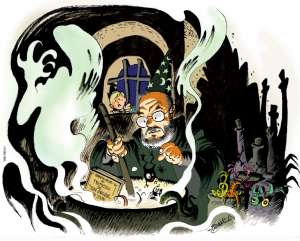CULTURE Umberto Eco, Leaving aside the Rhetoric
“A man’s dying is more the survivors’ affair than his own”. It is inevitable to think of Thomas Mann’s words when looking at the rhetorical orgy that marked Italy’s final farewell to Umberto Eco. From the tributes that flooded every square to the rivers of ink that have been spent to write about it, the last respects paid to the great intellectual are this year’s real jubilee. However, what would it be his own opinion about it? Wouldn’t he have preferred more meaningful pages and less empty words? A greater sobriety? Less hasty, more articulate judgments which may correspond better to his complexity and, why not, to his dark sides? When we met at his immense Foro Buonaparte house-library, near Sforza Castle in Milan, he seemed to me to be really enjoying himself looking at Enea Riboldi’s striking cartoon in Pagine Ebraiche. He was depicted as a more or less careful sorcerer’s apprentice ready to prepare poisons of all kinds. From his cauldron, the infamous Protocols of the Elders of Zion, a great classic of anti-Semitism, were coming out. For sure, they were drawn to condemn their impact, to name and shame their nature, to highlight their grotesque and tragic role. But when ghosts are haunting, who can tell what the consequences can reach. In the cartoon, in fact, the child representing the Italian Jewish community watches fearfully, through the grates of his alchemical laboratory, the morbid smog of the anti-Semitic trash rising from the cauldron. Later, in the long interview he gave to the Italian Jewish community newspaper, Eco analyzed and clarified every single point and doubt about it. The old collector’s habit of feeding the big audience with toxic texts just for the sake of dealing with both morbid and weird material, however, remained in the air. We hope that his intelligent action against prejudices will mark indelibly his million readers ‘mind. Without any negative impact on our friendship, this was a controversial side of the great intellectual, but it is not the only one the one-way eulogies have discreetly omitted in these days. Among his major contributions in the last few years, there is probably his thoughtful description of the effects of digital dementia and social network abuse on our manners of communication. The public opinion chose to remain silent even about it. Nevertheless, I find particularly relevant the professor’s last lesson, to the extent that it warns us against the dangerous trend, which is spreading also in the Jewish world, of a frenetic and immediate form of communication abuse to satisfy one’s need of unreasonable propaganda and power struggles, to disguise one’s fears and frustrations or just to commit an unreasonable villainy. Avoiding face-to-face interaction with your interlocutor to better spread illogical criticism, excommunication, slander and even lynching incitements means acting completely against the Jewish tradition. But, as Eco taught us, it also means entering an area in which the content of our message is swallowed up and influenced by the means of communication we use. Thank you, Professor, this thought helps us to keep in mind that a minority culture, in order to preserve its own nature and its freedom, must be able to create its own forms of expression, without trying to mimic the negative sides the dominant culture shows.
*This article has been translated in English by Isabella Favero, student at the Scuola superiore interpreti e traduttori di Trieste, who is doing her apprenticeship within the newsroom of Pagine Ebraiche. The artwork is by Enea Riboldi.

